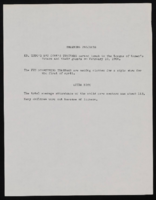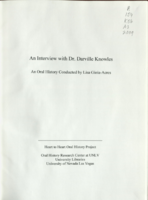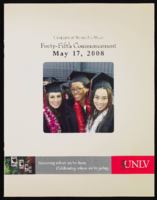Search the Special Collections and Archives Portal
Search Results

Mabel Hoggard: lesson plans and textbooks
Date
Archival Collection
Description
Folder of materials from the Mabel Hoggard Papers (MS-00565) -- Educational work and legacy file. The folder contains a "Teachers' manual for human geography," teaching notes, notes on United States history, assignments, and an exam book with handwritten notes. Many of the documents are handwritten.
Mixed Content
Megan Griffard oral history interview, 2024 August 22
Level of Description
Scope and Contents
Oral history interview with Megan Griffard conducted by Claytee D. White and Stefani Evans on August 22, 2024 for the UNLV Remembers: an Oral History of the 6 December 2023 Shootings project. In this interview, Griffard, UNLV assistant professor in the educational policy and leadership program, describes taking her 18-month-old daughter to the UNLV/CSUN Preschool on the UNLV campus before going to her office. She initially planned to go to the Student Union, where her colleagues had prepared poster presentations when she received the first alert and hid under her desk. Her husband called to tell her he had been called to prepare for mass casualties at UMC and the freeway was closed. She texted her dad, her coworkers, and called the preschool while hiding under her desk. She describes trying to get to the Methodist Church across Maryland Parkway, the designated spot for the preschool parents to be transported to the preschool to pick up their children. When her turn finally came, she was driven to the school and passed through layers of security before she could retrieve her daughter. Her husband soon arrived and the family was eventually able to go home together. The next day, Griffard returned to campus with her colleague who had been in the Student Union. The following Monday, Griffard and her coworkers held a Zoom meeting to check in with each other and talk about their experiences. She talks about the importance of finding the right therapist, learning how to process painful events, and realizing how her recovery has helped her shut down a tendency to people-please. Digital audio and transcript available.
Archival Collection
Collection Name: UNLV Remembers: an Oral History of the 6 December 2023 Shooting interviews
Box/Folder: Digital File 00 (Restrictions apply)
Archival Component

Neighborhood Youth Corps Work Training Project Summary, duties, and qualifications: documents
Date
Archival Collection
Description
From the Clark County Economic Opportunity Board Records -- Series II: Projects. This folder contains NYC Rules and Criteria, Mental and Physical Heatlh and Education for the Neighborhood Youth Corps Project, information on the program such as purpose, Mental and Physical Health Amendment, Health and Welfare Divison, Finance reports, and correspondence.
Text
Clare Woodbury oral history interview
Identifier
Abstract
Oral history interview with Doctor Clare Woodbury conducted by Ralph Roske on September 12, 1974 for the Ralph Roske Oral History Project on Early Las Vegas. Woodbury discusses education and medicine as well as sharing his experiences in the medical field in Las Vegas, Nevada.
Archival Collection
Magdalena Martinez oral history interview
Identifier
Abstract
Oral history interview with Magdalena Martinez conducted by Monserrath Hernandez and Barbara Tabach on April 4, 2019 for the Latinx Voices of Southern Nevada Oral History Project. In this interview, Magdalena Martinez recalls her childhood and growing up in Los Angeles, California. Martinez's parents are from Durango, Mexico, and immigrated to the United States in the 1970s. Martinez describes the generational differences that the women in her family faced and how the feminist movement of the 1970s did not resonate with women of color. Her family moved to Las Vegas in 1986 where she attended Bishop Gorman High School. After transferring to the University of Nevada, Las Vegas (UNLV) from community college and joining a student organization that would later become Student Organization of Latinxs, she became an early member of the Latino Youth Leadership Conference (LYLC) sponsored by the Latin Chamber of Commerce. Martinez describes how the LYLC has evolved over the years, and talks about her role in those changes. She discusses past work for CSN, NSHE, and currently is the Director of Education Programs with the Lincy Institute.
Archival Collection

Transcript of interview with Dr. Darville Knowles by Lisa Gioia-Acres, October 9, 2008 and November 9, 2008
Date
Archival Collection
Description
Dr. Darville Knowles was born in Miami, Florida, in 1948. His mother and father were schoolteachers in Dade County. After their divorce in 1962, Darville's mother relocated to Las Vegas with her two sons and took a teaching position here. Dr. Knowles comments on the differences between Miami and Las Vegas as far as segregation regarding housing, education, and job opportunities. He also mentions that his grandmother had emigrated from the Bahamas and that she impressed on them to make their own situation and community better. He recalls that track and field athletics were desegregated before the contact sports, such as football and basketball. Darville and his brother Michael (a lawyer in Miami) both graduated from college. Darville attended Howard University and Stanford University Medical School and completed his internship at the Jewish Hospital of St. Louis. Dan Wilkes, a family friend and pathologist in Las Vegas, convinced Darville to look at Las Vegas for job opportunities. After trying St. Louis, Atlanta, Houston, and Los Angeles, Dr. Knowles finally settled in Las Vegas in 1982 and "grew' his practice at Sunrise Hospital. Dr. Knowles comments on health problems in Las Vegas related to eating choices, lack of exercise, and poor air quality. He describes how HMOs have changed the practice of medicine and gives his opinions on how health care should be addressed by Congress. He also discusses the future of medicine, the research he was involved in, and the AIDS crisis. Dr. Knowles talks about how medicine has changed since 1982, the large number of respiratory problems that he treats, and comments further on HMOs and the fixture of medicine in Las Vegas. He also shares that he found time to author a murder mystery and has plans to write more.
Text

Transcript of interview with Judith Ann Allaire by Tracye Ann Collins, March 10, 1980
Date
Archival Collection
Description
Text

University of Nevada, Las Vegas (UNLV) 45th commencement program
Date
Archival Collection
Description
Commencement program from University of Nevada, Las Vegas Commencement Programs and Graduation Lists (UA-00115).
Text

Barry Holt interview, February 11, 1977: transcript
Date
Archival Collection
Description
On February 11, 1977, collector Lee LaVecchia interviewed Barry V. Holt (born January 20th, 1946 in Las Vegas, Nevada) at his home in Las Vegas, Nevada. In the interview, Mr. Holt speaks about the differences between growing up in Las Vegas in the fifties and sixties compared to how his children are growing up at the time of the interview. He also discusses education and the religious community in the city.
Text

Transcript of interview with Colleen Gregory by Tim Waters, April 6 & 7, 1976
Date
Archival Collection
Description
On April 6 and 7, 1976, Tim Waters interviewed Colleen Gregory (born 1928 in Santa Clara, Utah) about her life in Southern Nevada. Gregory first talks about her original move to Las Vegas, her early education, school activities, and her college education. She also talks about the first banks, Helldorado, the atomic testing, and environmental changes. Other topics covered include Howard Hughes, Western-style influences, first properties on the Strip, World War II, racial prejudice, and changes she has noticed during her career in banking.
Text
